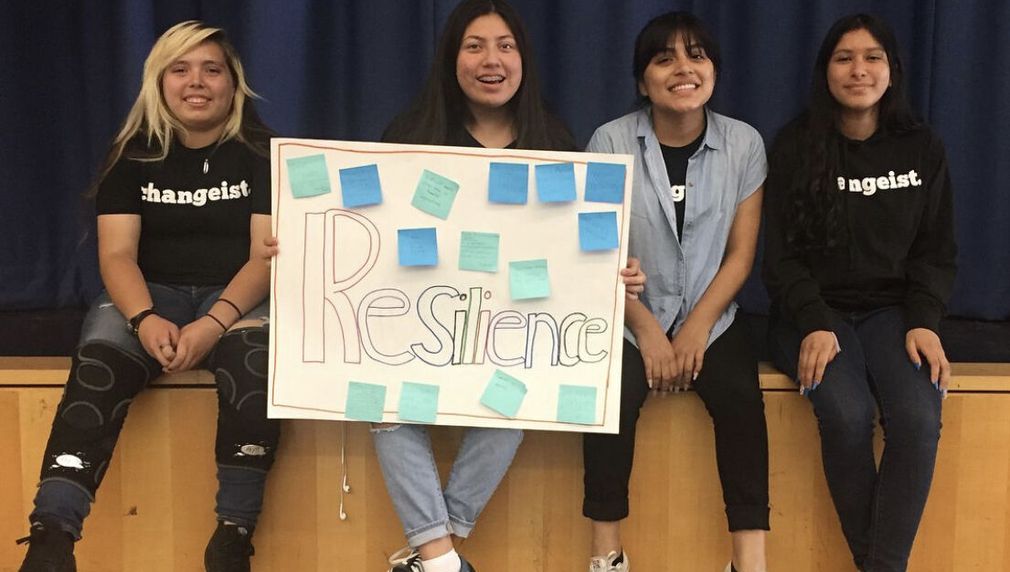Reimagining Mental Health Access for Youth
Changeist will pilot a model of mental health support that could be replicated by other out-of-school time organizations, that provides youth participants with easy access to a suite of high quality mental health services, free of charge. We are contracting a team of mental health professionals to support the learning of mentors and will be “on-call” for emergency and ongoing needs of youth, including counseling, mental health first aid training, and facilitated reflection for the community around impactful current events.

In which areas of Los Angeles will you be directly working?
County of Los Angeles
What is the problem that you are seeking to address?
Changeist is a place for young people to come together to dig into social justice issues affecting our communities, all while gaining a greater understanding of their own identities and where they fit into making change. It’s hard work. Our young people are often dealing with incredible challenges of their own, and our college-aged mentors are often tasked with leading difficult conversations around current events that they themselves are wrapping their heads around. These challenges are further exacerbated by COVID-19’s impact, and limited access to support systems our youth need. The coordination with schools, families, providers, and insurance can take too long, and cause a young person to give up on the process. This suite of services and team of contracted professionals will allow our staff to provide youth with the services they need, at the time they need them, with fewer barriers. It also allows for an array of service options and providers to find the right fit for each youth.
Describe the project, program, or initiative that this grant will support to address the problem identified.
Changeist plans to invest in a strategy that reimagines mental health access for our youth. For our 2021-22 program, we will contract a suite of mental health professionals that will be “on-call” for the following needs: - Immediate and free (to youth) access to mental health professionals for youth with emergency needs, including counseling services - Proactive mental health first aid training for staff and college-aged mentors - Facilitated reflection sessions for mentors periodically throughout the year and especially when impactful events occur (ie. violence toward racial groups, school shootings) We believe this strategy will uniquely allow us to address mental health needs in our community. This suite of professionals will allow us to respond more quickly to youth needs, while also strengthening our capacity as leaders to support our community during challenging times. We think this strategy will be more beneficial than bringing on a single staff member because it will allow us to contract professionals with different specialties and identities that will better serve more of our youth. It also allows us to truly measure the needs and costs associated with those needs, for future years.
In what stage of innovation is this project, program, or initiative?
Pilot or new project, program, or initiative
Approximately how many people will be impacted by this project, program, or initiative?
Direct Impact: 70
Indirect Impact: 350
Describe how Los Angeles County will be different if your work is successful.
We hope to pilot a strategy that could be replicated at other youth programs that don’t already serve the mental health needs of their participants. Youth programs are often the place where young people feel connected to adult mentors, especially if they don’t already find that in school or at home. This strategy could allow youth programs to serve youth with mental health needs, no matter what the program’s mission. If our young people enter adulthood with a better practice of attending to their mental health needs, they will be more satisfied and successful people, making change in LA County.
What evidence do you have that this project, program, or initiative is or will be successful, and how will you define and measure success?
To date, we have identified some needs within our community and have begun talking with professionals that are interested in the contract work. Some things we’ll be assessing are below: 1. Tracking programmatic needs for mental health support 2. Measuring response rates - how quickly we were able to connect and provide young people and mentors with the services they needed 3. Understanding how prepared mentors and staff feel to address/escalate mental health needs of youth 4. Understanding how mentors feel about having a trained professional facilitate reflections and team discussions 5. Learning from the pilot -- What are the gaps in this strategy? Are the total funds we need to serve youth realistic for future fundraising? Do we have the correct policies in place to manage the strategy? Is this strategy replicable?
Which of the LIVE metrics will you impact?
Mental illness
Access to mental health services
Indicate any additional LA2050 goals your project will impact.
LA is the healthiest place to CONNECT